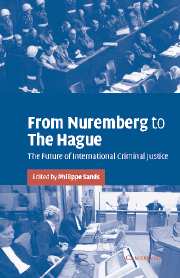Book contents
- Frontmatter
- Contents
- Notes on the contributors
- Preface
- 1 The Nuremberg trials: international law in the making
- 2 Issues of complexity, complicity and complementarity: from the Nuremberg trials to the dawn of the new International Criminal Court
- 3 After Pinochet: the role of national courts
- 4 The drafting of the Rome Statute
- 5 Prospects and issues for the International Criminal Court: lessons from Yugoslavia and Rwanda
3 - After Pinochet: the role of national courts
Published online by Cambridge University Press: 18 July 2009
- Frontmatter
- Contents
- Notes on the contributors
- Preface
- 1 The Nuremberg trials: international law in the making
- 2 Issues of complexity, complicity and complementarity: from the Nuremberg trials to the dawn of the new International Criminal Court
- 3 After Pinochet: the role of national courts
- 4 The drafting of the Rome Statute
- 5 Prospects and issues for the International Criminal Court: lessons from Yugoslavia and Rwanda
Summary
Introduction
On 27 November 1998, a short letter was published in the Guardian newspaper in London. It read:
The Cambodian couple in my street can't wait for Henry Kissinger's next visit.
The letter was published two days after the landmark first decision of the Judicial Committee of the House of Lords, ruling that Senator Pinochet was not entitled to claim immunity from the jurisdiction of the English courts in respect of a Spanish extradition request to face criminal charges for torture and other crimes against humanity, while he was head of state in Chile. The Guardian letter and the Pinochet judgment were based on a theoretically simple – but politically explosive – premise: no rule of international law existed to prevent the arrest in London (whether for the purposes of prosecution before the English courts or for extradition to a third state) of an American or Chilean national for acts occurring outside the UK and involving no real connection with the territory or nationals of the UK.
The Pinochet judgment was a landmark because it emphasised the role of national courts – Spanish and English – for the prosecution of the most serious international crimes. It relied on three principles:
that there are certain crimes that are so serious that they are treated by the international community as being international crimes over which any state may, in principle, claim jurisdiction;
[…]
- Type
- Chapter
- Information
- From Nuremberg to The HagueThe Future of International Criminal Justice, pp. 68 - 108Publisher: Cambridge University PressPrint publication year: 2003
- 3
- Cited by



